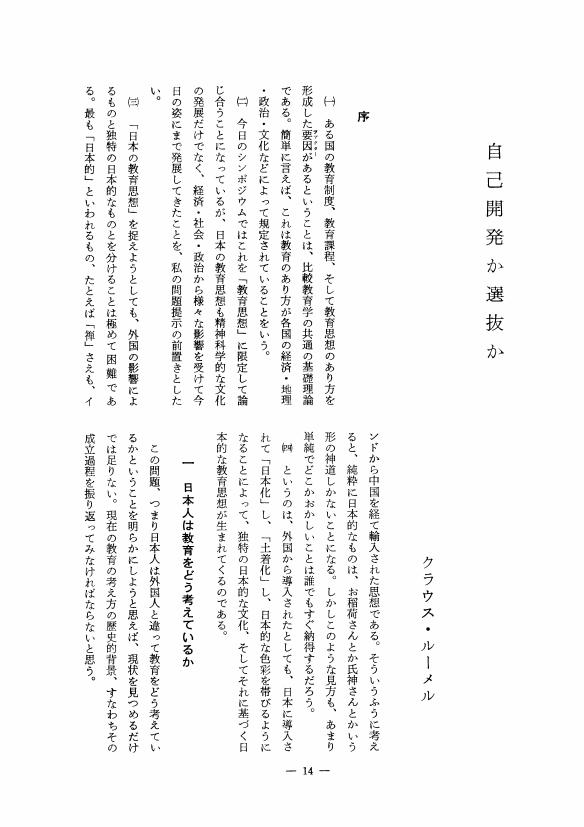2 0 0 0 OA エーリカ・マン著/田代尚弘訳『ナチズム下の子どもたち-家庭と学校の崩壊-』
- 著者
- クラウス ルーメル
- 出版者
- 教育哲学会
- 雑誌
- 教育哲学研究 (ISSN:03873153)
- 巻号頁・発行日
- vol.1998, no.77, pp.133-134, 1998-05-10 (Released:2009-09-04)
1 0 0 0 OA イデオロギー・権力・教育 ドイツと日本の場合
- 著者
- クラウス ルーメル
- 出版者
- 教育哲学会
- 雑誌
- 教育哲学研究 (ISSN:03873153)
- 巻号頁・発行日
- vol.1993, no.68, pp.54-64, 1993-11-10 (Released:2009-09-04)
1 0 0 0 OA 自己開発か選抜か
- 著者
- クラウス ルーメル
- 出版者
- 教育哲学会
- 雑誌
- 教育哲学研究 (ISSN:03873153)
- 巻号頁・発行日
- vol.1981, no.43, pp.14-18, 1981-05-10 (Released:2009-09-04)
1 0 0 0 OA Wolfgang Brezinka, Die Pädagogik der Neuen Linken. Suttgart : Seewald Verlag. 2. Aufl. 1973. 66 pp.
- 著者
- クラウス ルーメル
- 出版者
- The Japanese Society for the Philosophy of Education
- 雑誌
- 教育哲学研究 (ISSN:03873153)
- 巻号頁・発行日
- vol.1975, no.32, pp.56-60, 1975-10-10 (Released:2009-09-04)
1 0 0 0 OA ドイツ連邦共和国及びドイツ民主共和国における教育改革の動向 (一九四五~一九六五)
- 著者
- クラウス ルーメル
- 出版者
- 教育哲学会
- 雑誌
- 教育哲学研究 (ISSN:03873153)
- 巻号頁・発行日
- vol.1966, no.14, pp.56-88, 1966 (Released:2010-01-22)
- 参考文献数
- 57
Three school laws in East Germany form the landmarks of educational reform in this part of Germany. The first, the “Gesetz zur Demokratisierung der deutschen Schule, ” was passed in 1946, the second, the “Gesetz über die sozialistische Entwicklung des Schulwesens” in 1959 and the third, the “Gesetz über das einheitliche sozialistische Bildungswesen” in 1965. The educational reform thus initiated is based on the philosophy of dialectical materialism (“ Diamat ”) and aims progressively at the more perfect realisation of the “socialist man” by means of the educational system. The philosophical principles underlying the educational reform are reflected in the curriculum, in the school organisation and administration.The article compares the philosophy underlying educational reform in East Germany to that underlying the reform in West Germany. Contrary to the ideological uniformity which characterizes the reform in the East, in the West the pluralism of differing “Weltanschauung” is not affected by the reform. The philosophical principle on which reform is based in the West is that of freedom and tolerance as the most fundamental endowment of man. As in the East the uniform ideology produces a uniform system of education, likewise in the West the pluralistic trend in philosophic thought results in an educational system which is rich in variety and does not attempt to force any one particular pattern of thought on the young. While refraining from any type of indoctrination, the schools in West Germany do, however, favor de facto the spirit of Christian Humanism, or what is understood to be in the mind of educational reformers in West Germany the cultural heritage of the occident. (“das kulturelle Erbe des Abendlands”)



